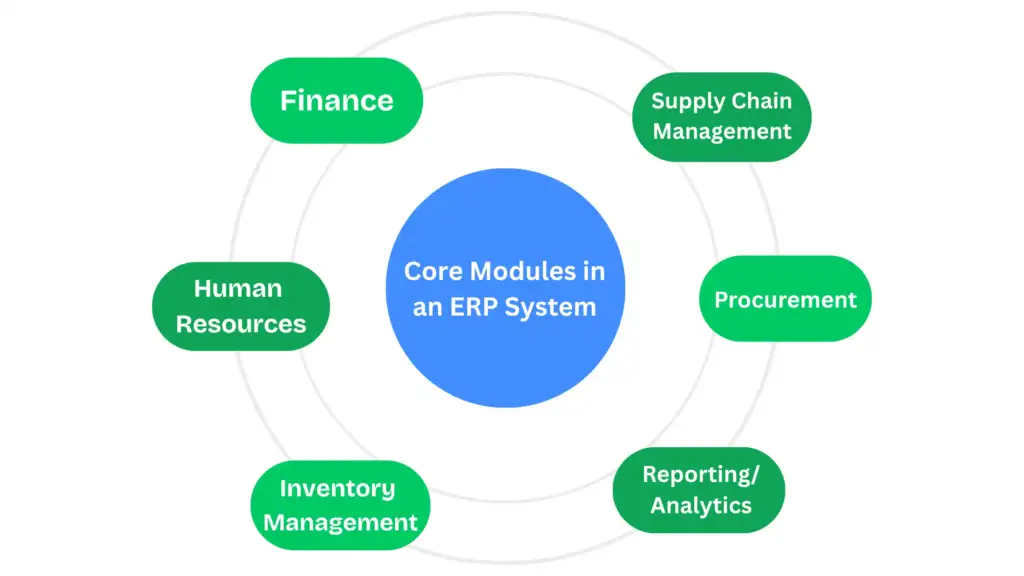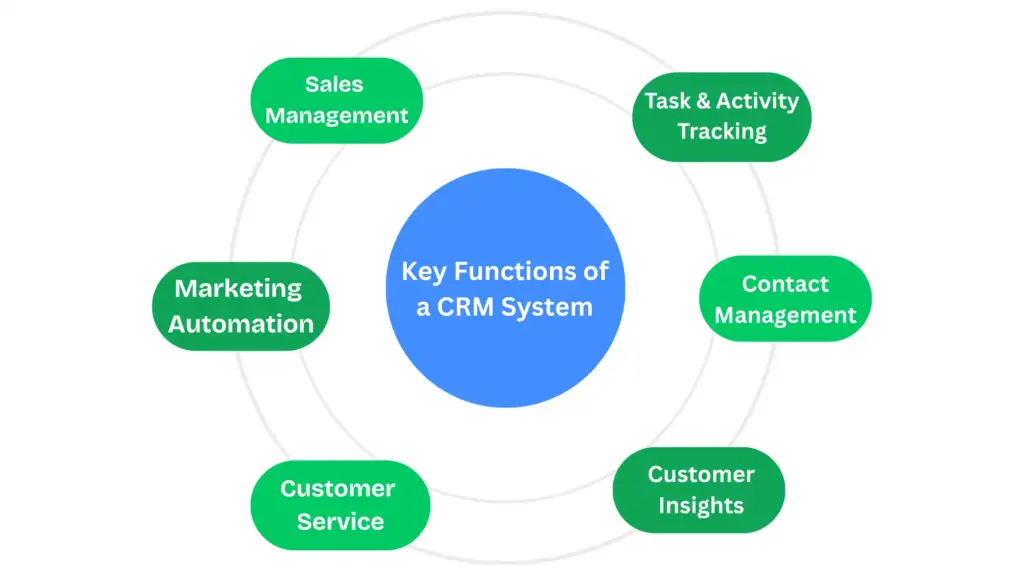Nikoo Samadi
You’re running a growing business, and suddenly, you’re hearing a lot about the difference between CRM and ERP. One helps manage operations; the other focuses on customers. But what’s the actual difference? And more importantly, do you really need both?
In this post, we’ll explain the difference between CRM and ERP, describe how each system works, and help you decide what your business actually needs. Whether you’re scaling up or just trying to stay organized, understanding these ERP and CRM systems can save you time, money, and a lot of confusion.
What Is an ERP System?
An ERP (Enterprise Resource Planning) system is software that helps businesses manage their day-to-day operations in one place. Think of it as a central hub where your accounting, inventory, human resources, purchasing, and supply chain data all live together.
Instead of jumping between different apps and spreadsheets, an ERP system connects everything so teams can work faster, with fewer errors, and better visibility.
Example:
Let’s say a company receives an order. With ERP, that order automatically updates inventory, triggers invoicing in the finance system, and notifies the warehouse team. No double entry, no guesswork.
When discussing the difference between CRM and ERP, ERP is more about what’s happening behind the scenes.


What Is a CRM System?
CRM stands for Customer Relationship Management. While ERP systems focus on running your business internally, a CRM system helps you manage relationships with customers, from the first interaction to long-term loyalty.
A CRM keeps track of things like:
- Contact information
- Communication history
- Sales opportunities
- Customer service requests
It helps sales, marketing, and support teams stay connected to your customers and close more deals.
Example:
Imagine your sales team reaches out to a lead. The CRM logs that call, sets a reminder for follow-up, and updates the sales pipeline. If the customer later has a support issue, your service team sees the full history. Therefore, no repetition, no frustration.
In the world of ERP and CRM systems, CRM plays the front-end role: improving customer experience and driving revenue growth.


Key Differences Between CRM and ERP
Understanding the difference between CRM and ERP is important because both improve business operations but serve different purposes.
Primary Focus
- ERP (Enterprise Resource Planning):
ERP helps manage core business functions like finance, supply chain, manufacturing, HR, and inventory. It brings these into one system to improve how the business runs. - CRM (Customer Relationship Management):
CRM manages customer interactions. It supports sales, marketing, and customer service by keeping customer info organized and tracking communications.
Data Management
- ERP:
ERP collects data from many departments into one place. This keeps data consistent and up to date for better decisions. - CRM:
CRM focuses on customer data. It tracks preferences, history, and behavior to help personalize marketing and improve service.
Users and Departments
- ERP Users:
Usually back-office teams like finance, HR, operations, and supply chain use ERP to manage internal tasks. - CRM Users:
Front-office teams—sales, marketing, and customer support—use CRM to handle customer relationships.
Automation Capabilities
- ERP:
ERP automates routine tasks like order processing, payroll, and inventory tracking. This cuts down on errors and saves time. - CRM:
CRM automates customer-related tasks such as scoring leads, sending email campaigns, and managing support tickets. This boosts customer engagement.
Financial Management
- ERP:
Financial management is a core part of ERP. It handles accounting, budgeting, and reporting to keep finances accurate and compliant. - CRM:
CRM is not mainly for finance but offers insights like sales forecasts and customer profitability to help with planning.
Implementation Complexity and Cost
- ERP:
ERP takes longer to set up and costs more. It often needs significant resources and change management. - CRM:
CRM is usually faster and cheaper to implement. It suits businesses that want better customer management without major changes.
Integration Potential
- ERP and CRM Integration:
Connecting ERP and CRM systems gives a full view of both operations and customers. This smooth data flow improves efficiency across the company.
Do You Need Both ERP and CRM Systems?
Choosing between ERP and CRM depends on your business and what it needs right now.
When a CRM System Is Enough
- Small businesses or startups: If your main goal is to manage customer relationships and sales, a CRM system works well. It tracks contacts, leads, and helps keep communication smooth.
- Simple operations: If your business doesn’t have complex inventory or supply chains, CRM alone might cover your needs.
Signs Your Business Needs an ERP Solution
- Complex operations: If you manage manufacturing, inventory, or supply chains, ERP is important. It links different parts of your business into one system.
- Financial control: ERP handles detailed financial tasks like accounting, budgeting, and compliance, making it easier to keep track.
Combining ERP and CRM
- Growing businesses: As your company gets bigger, using both systems helps manage customers and operations without missing a beat.
- Better decisions: Combining data from both systems gives a fuller picture of your business and customers, which supports smarter choices.
Integration Matters
Connecting your ERP and CRM systems ensures your data stays consistent. For example, a customer order in the CRM can update your ERP inventory automatically, cutting down on errors and manual work.
Simplify Your Decision with GEM365
Get in touch with GEM365 to guide you through the process and get consultation for free.
Benefits of Integrating ERP and CRM Systems
Using ERP and CRM together gives your business several advantages. When these systems work in sync, you get a clearer, faster view of your operations and customers.
- Improved Data Accuracy
Integration reduces manual data entry. Customer orders and payments update automatically in both systems. This cuts mistakes and keeps records consistent. - Better Customer Service
When customer info and order status are linked, your support team can answer questions quickly. Customers get accurate updates, which builds trust. - Streamlined Processes
Integration means teams don’t have to switch between systems. Sales, finance, and operations work smoothly together, saving time and effort. - Faster Decision-Making
Access to combined data gives managers a full picture. They spot trends and issues faster, making it easier to act on what matters. - Scalable Growth
As your business grows, integrated ERP and CRM systems handle more customers and more complex operations without slowing down.
Choosing the Right System(s) for Your Business
Picking the right software depends on what your business needs now and where you want to go.
- Start with Your Priorities
Identify your biggest challenges. Is it managing customers better, or streamlining operations and finances? Your answer guides your choice. - Consider Your Budget and Resources
ERP systems can be costly and take time to set up. CRM solutions are usually quicker and less expensive. Think about what you can invest in and support over time. - Think About Growth
If you plan to expand, choose systems that can grow with you. Sometimes starting with a CRM makes sense, then adding ERP later as operations get more complex. - Look for Integration Options
If you need both, pick systems that work well together. Good integration saves headaches and boosts efficiency. - Seek Expert Advice
Don’t hesitate to consult experts or vendors. They can help match your business goals with the right tools.
Final Thoughts
The difference between CRM and ERP lies in their focus and use. Both serve important roles in business success.
If you focus on customer relationships, start with CRM. If managing operations and finances is your priority, look to ERP. For growing businesses, using both ERP and CRM systems can provide a complete solution.
Integration between the two brings the best of both worlds, such as streamlined processes, accurate data, and smarter decisions.
Table of Contents
Read more
- Business Central Cloud vs On Premises: Which to Choose
- Forbes Reveals the Best Cloud ERP: Here’s Why Business Central Wins
- How the Microsoft Power Apps Platform Transforms Manual Processes
- Top Power Automate Workflows Every Business Should Use in 2025
- Microsoft Copilot AI Agents: Build Your First AI Agent


Forbes Reveals the Best Cloud ERP: Here’s Why Business Central Wins


How the Microsoft Power Apps Platform Transforms Manual Processes


Top Power Automate Workflows Every Business Should Use in 2025






